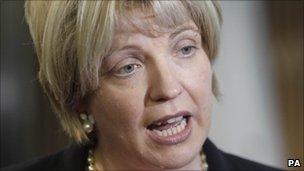Irish government rules out raising corporation tax
- Published

Mary Coughlan said there would be no change to the tax rate
The Irish government has insisted it will not raise the country's low corporation tax rate in return for a European Union-led bail-out.
Deputy Prime Minister Mary Coughlan said the 12.5% rate - much lower than the EU average - was "non-negotiable".
Her comments come as speculation grows that France and Germany want Dublin to raise the tax in return for aid.
Meanwhile a bank at the heart of the crisis, Allied Irish Banks, said 17% of its deposits had flown this year.
The Irish government is in bail-out talks with officials from the EU, the European Central Bank and the IMF.
Bank woes
Although the Irish government claims to be fully-funded until the middle of next year, it has provided a blanket guarantee to the Irish banks, some of whom are now finding it impossible to borrow money in the markets.
that businesses and institutions accounted for most of the 13bn euros ($18bn, ÂŁ11bn) deposit flight, implying that the bank does not face a run by ordinary depositors.
AIB's admission is another sign of a steady loss of confidence in the Irish banks that has forced them to become increasingly reliant on the European Central Bank and the Irish Central Bank to refinance their debts.
The bank said it intends to raise 6.6bn euros by issuing new shares, although in the current market environment the Irish government is the only investor likely to buy them.
Imminent deal
An aid package is expected to emerge next week, according to an unnamed source quoted by the Reuters news agency.
Brian Cowen: "We have to... have a banking system that functions properly"
It will coincide with, or follow shortly after, the announcement by the Irish Republic of a new four-year austerity programme.
On Thursday, the Irish government admitted for the first that it needed outside help.
Finance Minister Brian Lenihan said he felt "no sense of shame" over the country's economic record, but that it now needed outside help.
Previously the government had said it did not need any financial support from the European Union and International Monetary Fund (IMF).
'Predatory'
The Republic's low corporation tax has been criticised by other EU nations, who argue that it gives the country too much of an advantage in attracting overseas investment.
They now argue that the Republic should not be allowed to solely rely on a bail-out, and that it should instead raise the tax rate to help boost government funds.
The Financial Times on Friday reported a French official describing it as "almost predatory".
However, the Republic's European Minister Dick Roche, also insisted that the corporation tax rate was "certainly not up for negotiation".
He told the ±«Óătv: "There has been some very unhelpful chatter in the background in the last few days about our corporation profit tax.
"Where would be the sense of destroying one of the great drivers of growth?"
EU, European Central Bank, and IMF officials arrived in Dublin on Thursday to discuss the country's debt crisis, and what aid the country required.
The Republic's Central Bank Governor, Patrick Honohan, said he expected a loan in the region of "tens of billions" of euros.
Finance Minister Mr Lenihan said the country's problem were caused by its heavily indebted banks, which the government has had to bail-out to the cost of 45bn euros (ÂŁ39bn; $60.1bn).
"The big difficulty of course is that the banks grew to such a size that they became too unmanageable for the state itself, that's the big difficulty here," he said.
"And that's why we have to consider external assistance to stabilise our banking system."